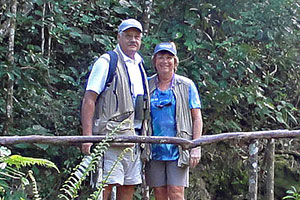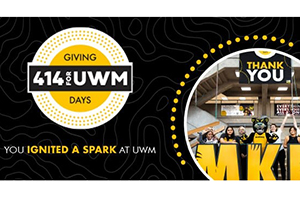Researchers at the UWM Field Station are about to get support from a $250,000 fund founded by a UWM Botany alum.
The James and Dorathea Levenson Endowment for Ecology and Field Biology was established earlier this year and will provide fellowships to UWM graduate students who are conducting research at the Field Station or in Cedarburg Bog. James B. Levenson, who graduated in 1976 with his doctorate in botany, said the fund is his way to give back to the university that nurtured him.
“When you get to this stage, you start to look at what comes later,” he said. “The last thing we wanted to do was just let the assets that we accumulated dwindle away. We wanted to put them into something that would continue giving, and I was just so grateful to be at UWM and working with [then-Botany] Professor Forest Stearns.”

Levenson’s endowment will fund several fellowships each year in perpetuity, with a preference for students who are military veterans. Levenson is a veteran of the U.S. Air Force. After leaving the military and earning his doctorate, he spent most of his career at Argonne National Laboratory in Illinois, where Dorathea worked in information technology and cyber security. Now that the Levensons are retired, they enjoy traveling and bird-watching, especially pelagic birds that spend the majority of their lives on the open ocean.
Though her background is in computer science, Dorathea says she’s excited to create this endowment that will support graduate student research.
“I think it’s a wonderful use of the money, supporting graduate students who do field work,” she said.
Biology professor Jeffrey Karron is grateful for the opportunities that will be open to current students.
“This wonderful endowment will provide critical summer fellowship support,” Karron said. “One of the major challenges for graduate students in ecology is that they need to focus on field work during the summer months and therefore can’t be on campus supported by a teaching assistantship. With these very generous fellowships, students can spend all of their time doing field work.”
That’s the Levensons’ great hope – that the students who receive fellowships from this fund can get their hands dirty as they work.
“I wanted to be sure with this endowment that we were providing an opportunity where scientific design, hands-on experience, primary data collection, and sound data collection, forms the basis for the recipients in pursuit of their research,” he said. “They’re out there swatting mosquitoes and sweating and working hard.”
The UWM Field Station sits in the Cedarburg Bog, a 2,000-acre piece of undisturbed wetlands that provide students with the opportunity to conduct field research in a natural setting. Located in Saukville, Wisconsin, the Field Station and bog are the ideal place to study plant and animal ecology.
The Cedarburg Bog holds special meaning for Levenson; his grandfather was born in Cedarburg to German immigrant parents in 1886. He spent many years of his life exploring the bog on foot and snowshoe. He passed that love of the land onto Levenson’s father, who passed it on to Levenson.
Levenson conducted some of his doctoral research at the Field Station, where he studied “forest islands” – woodlots scattered in an urban and agricultural “sea” – and how tree and animal species interacted between the lots, how the islands were distributed, how they sustained themselves, and more.
He’d love to see a 50-year follow-up study done on the forest islands he studied in graduate school. It may just be a project for one of the students who earns a fellowship from his fund.



